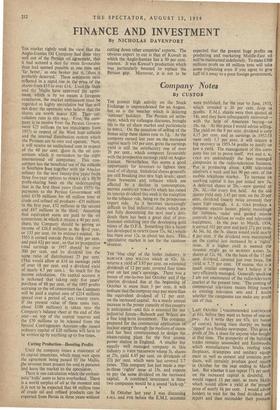Company Notes
By CUSTOS THE present high activity on the Stock Exchange is unprecedented for an August, but so is the weather which is delaying 'summer' holidays. The Persian oil settle- ment, which my colleague discusses, brought life to the oil share market and particularly to SHELL. On the cessation of selling of the bonus scrip these shares rose to 5151f. As the company earned last year on the increased capital nearly 145 per cent. gross the earnings yield is still the satisfactory one of over 28 per cent., which compares favourably with the prospective earnings yield on Anglo- Iranian. Nevertheless, this seems a good opportunity for investors to lighten their load of oil shares. Industrial shares generally are still breaking into new high levels; apart from breweries and tobacco which are affected by a decline in consumption. BRITISH AMERICAN TOBACCO Which has raised its interim dividend this week is the exception to the tobacco rule, being on the prosperous export side. As it becomes increasingly difficult to find industrial shares which are not fully discounting the next year's divi- dends there has been a great deal of pro- fessional switching into the developing gold mines of the O.F.S. Something like a boom has developed in OFSITS (now 73s. 9d.) which has risen over 12s. in about ten days. This
speculative market is not for the cautious • • Investor.
THE 'blue chip' of the boiler industry, is BABCOCK AND WILCOX which at 62s. 3d.
returns a yield of 3.85 per cent, on estimated dividends of 12 per cent. covered four times over on last year's earnings. There was a bonus of one-in-two last October and if the interim dividend duo at the beginning of October is more than 5 per cent. it will indicate that the company may pay more than the equivalent dividend of 12 per cent.
on the increased capital. As a steady annual increase in the power capacity of this country
is anticipated-and this is essential for our industrial future-Babcock and Wilcox are a fine long-term investment. The company prepared for the commercial application of nuclear energy through the medium of steam and has been commissioned to design the steam-raising plant for the first atomic power station in England. A smaller but equally well managed company in this industry is JOHN THOMPSON whose Ss. shares at 25s. yield 4.45 per cent. on dividends of 224 per cent. which were last covered 3.7 times. This company has just made a one- in-three 'rights' issue at 15s. and expects to pay the same dividend on the increased capital. A combined investment is these two companies would be a sound lock-up.'
•
In October last year I was discussing E.M.I. and rya before the E.M.I. accounts were published, for the year 'to June, 1953, which revealed a 30 per cent. drop in Profits. E.M.I. shares were then quoted at 14s. and they have subsequently recovered- with the help of American buying-to 18s. 6d. At this price I would advise selling. The yield on the 8 per cent. dividend is only 4.15 per cent. and as earnings in 1952-53 were only 1.7. per cent. it will require a big recovery in 1953-54 profits to justify so low a yield. The management of this coin- pany has yet to prove itself. PYE and E. K. COLE are undoubtedly the best managed companies in the radio-television business. Pye is producing about 4,000 television receivers a week and has 90 per cent. of the mobile telephone market. To increase its working capital it has just issued new 5s. ,A deferred shares at 20s.-now quoted at 29s. 3d.-for every five held. As the old shares yield only 3.45 per cent. on the 20 per cent. dividend (nearly twice covered) they seem high enough. E. K. COLE produce a domestic electric heater, plastic mouldings for cabinets, radar and guided missile controls in addition to-radio and television equipment. In the year to March, 1954, it earned 101 per cent and paid 274 per cent. At 34s. 6d. the 5s. shares would yield nearly 4 per cent. if the dividend were maintained on the capital just increased by a 'rights' issue. If a higher yield is wanted the investor might go to MURPHY RADIO 55. shares at I 2s. 9d. On the basis of the 15 per cent. dividend, covered just over twice, the yield is 5.75 per cent. Of course, this is a much smaller company but I believe it is very efficiently managed. Generally speaking I am not enamoured of the radio-television market at the present time. ' The coming of commercial television means fitting tuners to existing television sets and I doubt whether the companies can make any profit out of that.
LAST October 'recommended EAsTwooDS at 61s. before they went ex bonus of one-in- two. As I write they are 67s. (ex bonus of course), having risen sharply on being 'tipped' in a Sunday newspaper. This gives a profit of 26s. a share for anyone who bought at that time. The prosperity of the building trades remains unassailed and l3astwoods, which manufactures bricks, roofing tiles, fireplaces, drainpipes and sanitary equip- ment as well as cement and concrete pro- ducts, will certainly produce good results in October for the year ending in March last. But whether it can repeat 174 per cent. on the increased capital is doubtful. I would regard 15 per cent. as more likely, which would allow a yield at the' present price of nearly 44 per cent. I would advise holders to wait for the final dividend and report and then reconsider their position,


































 Previous page
Previous page